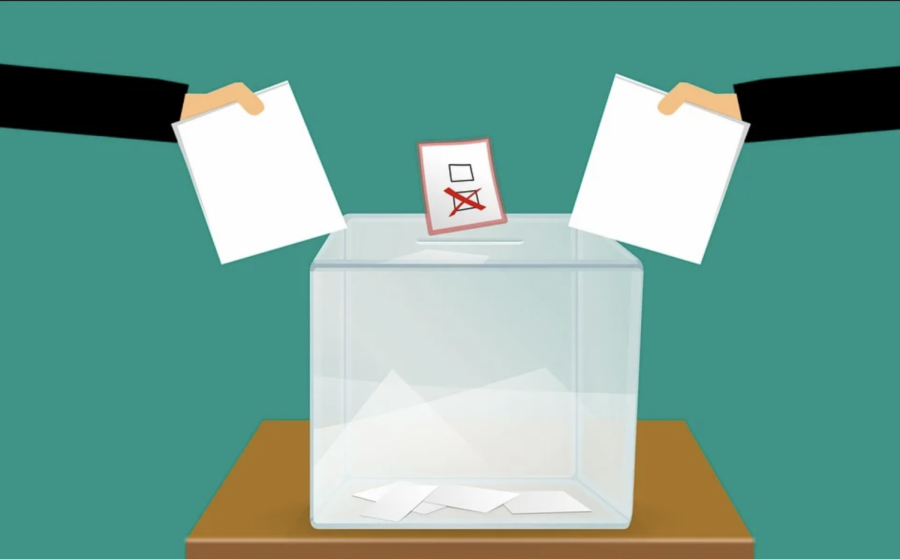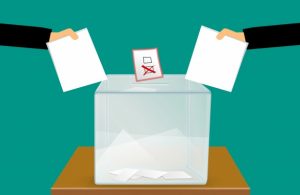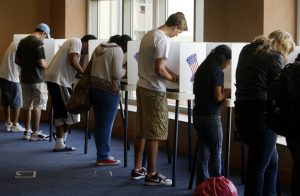Why GenZ needs to vote in 2020
Generation Z, which includes people born in 2000 or later, will have a significant role in the 2020 elections.
May 28, 2020
Generation Z includes all of us — it refers to babies born from the mid-2000s through today. Come Nov. 3, an entirely new generation will be able to vote and play a role in American politics. Although voting will make a statement, there is a strong significance behind voting. Generation Z must understand their own significance and the role they play in the 2020 election.
In our country, given the current state of living during a global pandemic, everyone is reacting differently, and it’s no secret that Generation Z will be massively impacted. College admissions are changing, UC’s are phasing out standardized testing, DMV driving exams are indefinitely postponed, and in March 2020, the Pew Research Center found that “half of the oldest Gen Zers (ages 18 to 23) reported that they or someone in their household had lost a job or taken a cut in pay because of the outbreak.” The uncertainty is incomprehensible.
On the other hand, there is no shortage of spring breakers, consisting of older Gen Z’ers and millennials, partying at beaches when it is clearly not the safest thing to do. NBC Reporter Michael Arceneaux remarked that, “Although this is upsetting, it’s not surprising — people in power-largely older white men have failed the nation by not properly preparing for its effects in spite of dire warnings.” Or in other words, “the people in charge have given [young people] no real reason to give a damn.” Such showcases the drastic divide in the generation and a divide like this can be quite dangerous.
For instance, “on Election Day in 2016, only about half of the 62 million millennials who were eligible to vote showed up to the polls, compared to approximately 70% of the 70 million eligible baby boomers. This is a difference of up to 18 million potential voters, or 1.5 million shy of the population of New York state, Newsweek reporter Josh Lowe remarked.
An article from Harvard Politics acknowledges how voter turnout in 2016 was dangerously low, but also showcases that members of Gen Z will be of voting age in 2020 and that they can dramatically impact the election, “if they vote” in the first place.
As a matter of fact, “the percentage [of Gen Z predicted to vote in 2020] is much higher than the actual 2016 college-student voter turnout, which was 48.3%, according to The National Study of Learning, Voting, and Engagement (NSLVE), conducted by Tufts University.” Business Insider reports that 80% of Gen Z college students plan on voting in 2020, which is good news, but hopefully the current state of society doesn’t cause Gen Z’ers to lose faith in government and end up not voting.
The Pew Research Center found that members of Gen Z are “more racially and ethnically diverse than any previous generation, and they are on track to be the most well-educated generation yet.” Members of Gen Z are programmed to look at society from a rather innovative perspective. “Most see the country’s growing racial and ethnic diversity as a good thing,” and also don’t see the US as a superior country compared to other nations.
Generation Z, statistically, has the ability to change society as we know it. There is no formula for how Gen Z will or should act to better the country, but one thing for sure is Gen Z’ers must avoid political ignorance. According to Washington Post contributor Ilya Somin, “a high percentage of the public is often ignorant of even very basic information, such as which party controls congress, which officials are responsible for which issues and how the federal government spends our tax money.”
High levels of political ignorance are created by multiple factors. Not only are most voters bad at “evaluating what information they know,” there is a political bias “exacerbated by the intense partisanship and polarization that has descended upon American politics in recent years,” Somin emphasizes.
Political ignorance has been known to be a “major contributor to racism, xenophobia and zero-sum thinking,” and rising ignorance is more prominent in periods of slow/little economic growth, such as what the U.S. is experiencing right now.
Personally, I would like to believe that political ignorance within Gen Z is rather unlikely. After all, members of Gen Z are “less likely to drop out of high school and more likely to be enrolled in college.” But at the same time, I believed that all members of Gen Z would know what is going on in the world and evaluate all information from leaders and that was wrong.
No one can be legally required to vote, and voting is a right. The key thing to note is that voting is a privilege and civic duty as a U.S. citizen. I want the world to change, but I am only one person in Gen Z. If we all want change, we have to start somewhere. If you are part of Gen Z and you are eligible to vote in 2020, please, go vote.
——–
Despite such statistics and information, though, the next generation seems to be quite unsure about who to vote for, especially since Bernie dropped out of the race recently and Generation Z doesn’t feel like they are being represented properly in their party, thus further incentive not to vote.
This is primarily because “Many of these voters preferred Bernie Sanders in the Democratic primary and perceive Biden as a blank slate. They aren’t sure that he’s a change agent or that his policies match the scale of their problems. Some worry about his age and fitness. Most seem open to supporting Biden to stop Trump but need to hear more from him.”




